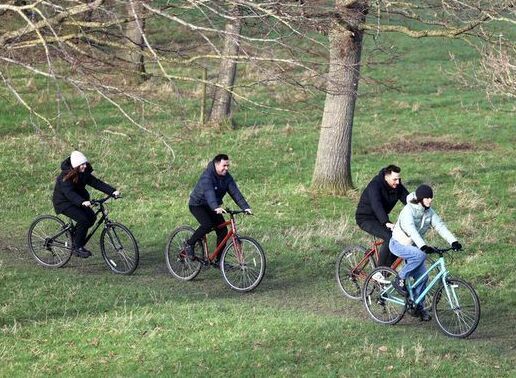Colum McCann in Woodside after Sunday’s 2016 St. Pat’s For All Parade, of which he was co-grand marshal with Loretta Brennan Glucksman.
Page Turner / Edited by Peter McDermott
“Colum McCann first won fans around the world with his bestselling novel ‘Let The Great World Spin.’” So opened the introduction on National Public Radio’s website to an interview with the Irishman about his latest book. An alert copyeditor might have taken out the word “first.” Certainly, the 2009 winner of the National Book Award was a huge hit, but McCann has been attracting followers and winning praise for his literary fiction as far back as the 1990s.
And the rave notices have come, too, for “Thirteen Ways of Looking,” his most recent book. “The irreducible mystery of human experience ties this small collection together, and in each of these stories McCann explores that theme in some strikingly effective ways,” said the Washington Post’s reviewer. “[He] has perfected a method of finely blending his own narration with his characters’ thoughts and dialogue.”
“McCann is a writer of power and subtlety and beauty,” added Sarah Lyall in the New York Times. “The powerful title story loiters in the mind long after you’ve read it.”
Meanwhile, the Wall Street Journal reviewer said: “McCann is a passionate writer whose impulse is always toward a generous understanding of his diverse characters.”
When asked by the Echo to describe “Thirteen Ways of Looking,” McCann said, “[U]ltimately, I suppose it's a collection of short stories that are about redemption and grace in the face of random violence.”
Colum McCann
Date of birth: Feb 28, 1965
Place of birth: Dublin
Spouse: Allison
Children: Isabella, John Michael and Christian
Residence: New York
Published works: Nine books.
What is your writing routine? Are there ideal conditions?
The ideal condition would be to wake up early in the morning, 5 or 6, and then to immediately launch into the "dreamtime" of work -- without touching the newspaper, or opening an e-mail, or anything else that might clog up the day.
What advice do you have for aspiring writers?
I recently began giving weekly advice to young writers on my website and this was my first entry: “Do the things that do not compute. Be earnest. Be devoted. Be subversive of ease. Read aloud. Risk yourself. Do not be afraid of sentiment even when others call it sentimentality. Be ready to get ripped to pieces: it happens. Permit yourself anger. Fail. Take pause. Accept the rejections. Be vivified by collapse. Try resuscitation. Have wonder. Bear your portion of the world. Find a reader you trust. Trust them back. Be a student, not a teacher, even when you teach. Don’t bullshit yourself. If you believe the good reviews, you must believe the bad. Still, don’t hammer yourself. Do not allow your heart to harden. Face it, the cynics have better one-liners than we do. Take heart: they can never finish their stories. Have trust in the staying power of what is good. Enjoy difficulty. Embrace mystery. Find the universal in the local. Put your faith in language — character will follow and plot, too, will eventually emerge. Push yourself further. Do not tread water. It is possible to survive that way, but impossible to write. Transcend the personal. Prove that you are alive. Have trust in the staying power of what is good. We get our voice from the voices of others. Read promiscuously. Imitate. Become your own voice. Sing. Write about that which you want to know. Better still, write towards that which you don’t know. The best work comes from outside yourself. Only then will it reach within. Restore what has been devalued by others. Write beyond despair. Make justice from reality. Make vision from the dark. The considered grief is so much better than the unconsidered. Be suspicious of that which gives you too much consolation. Hope and belief and faith will fail you often. So what? Share your rage. Resist. Denounce. Have stamina. Have courage. Have perseverance. The quiet lines matter as much as those which make noise. Trust your blue pen, but don’t forget the red one. Allow your fear. Don’t be didactic. Make an argument for the imagined. Begin with doubt. Be an explorer, not a tourist. Go somewhere nobody else has gone, preferably towards beauty, hard beauty. Fight for repair. Believe in detail. Unique your language. A story begins long before its first word. It ends long after its last. Don’t panic. Trust your reader. Reveal a truth that isn’t yet there. At the same time, entertain. Satisfy the appetite for seriousness and joy. Dilate your nostrils. Fill your lungs with language. A lot can be taken from you — even your life — but not your stories about your life. So this, then, is a word, not without love, to a young writer: write.”
Name three books that are memorable in terms of your reading pleasure.
“Ulysses” by Joyce. “Coming through Slaughter” by Ondaatje. “To the Wedding” by Berger.
What book are you currently reading?
“I am currently reading applications to the Hunter College MFA program in Creative Writing ... that's 330 applications at 30 pages each, so I have no time for other books.”
Is there a book you wish you had written?
There are so many, but I suppose I wish I had written anything by Michael Ondaatje or John Berger or Peter Carey, three of my great heroes.
Name a book that you were pleasantly surprised by.
I am always surprised by the magic realism of the Bible.
If you could meet one author, living or dead, who would it be?
I would love to have an afternoon in the pub with Joyce.
What book changed your life?
My father wrote several books, including a series of kids’ soccer books, the first of which was called "Goals for Glory." It's 40 years ago now but I remember the manuscript pages as if I only touched them yesterday
What is your favorite spot in Ireland?
I have a great fondness for Strangford Lough up north.
You're Irish if you’re…
Torturously poetic. Unbearably self-conscious. Awkwardly comic. Willfully ambiguous. And if you never forget a grudge.
PHOTO: PETER MCDERMOTT









